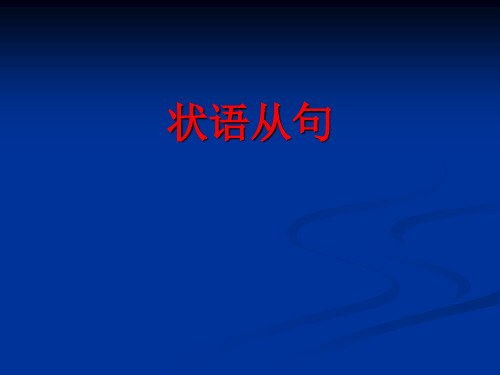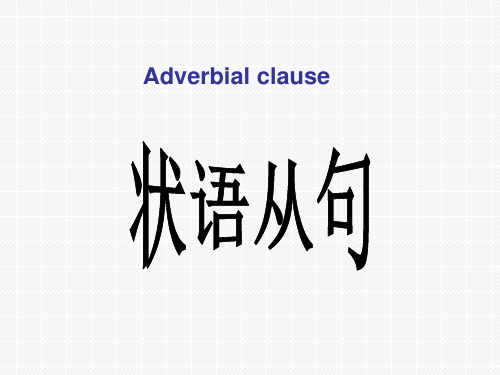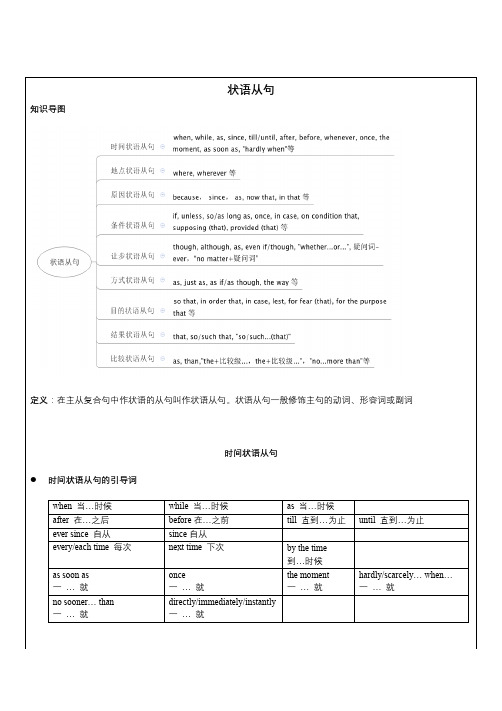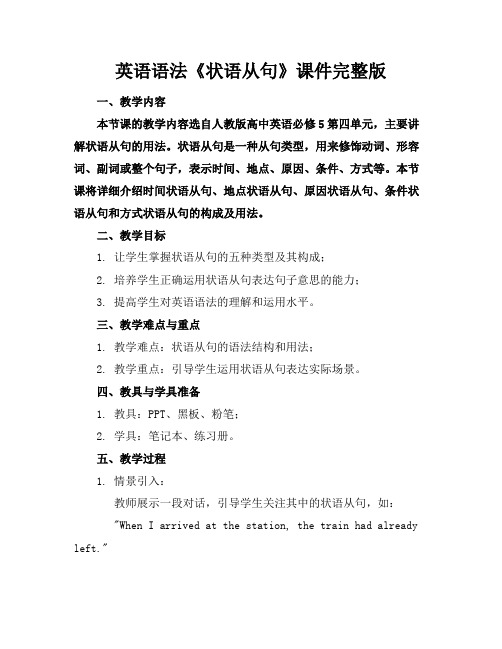高中英语语法-状语从句讲义
高中英语语法课件_状语从句 (共42张PPT)

whether…or…
whether…or…引导的让步状语从句: △ 这种从句也称“选择条件-让步状语从句”,可位于 主句之前或之后,如: 1.Whether you like it or not, you’ll have to do it. 2. We hold that all countries, (whether they are) big or small, (whether they are) rich or poor, should be equal. 3. Whether it rains or snows, I will go tonight. 5. She had to go, whether or not she wanted it.
2) 一些表示时间的名词词组也可引
导时间状语从句。如:the moment, the minute, (一…就)next time (下次), every/each time (每 次)。 e.g. The moment he comes, I will tell him.
4) as soon as, immediately, directly, instantly 等副词也可引 导状语从句。表示“一…… 就……”。
.
1. I was so familiar with him that I recognized his voice ______ I picked up the phone. A. while B. after C. In case D. the minute 2. How long do you think it will take _______ our product becomes popular with the consumers? A. when B. until C. before D. since
高中英语语法总结之状语从句(共37张ppt)

• Difficulties are nothing if we are not afraid of them.如果我们不怕困难,困难就算不了什 么了。
• We shall go there tomorrow unless it rains. = We shall go there tomorrow if it doesn’t rain. 除非下雨,我们明天就去那里。
• Every time I travelled by boat, I got seasick.我 每次乘船都晕船。
• The moment I heard the song, I felt cheerful. 我一听到这首歌,就感到很愉快。
• Next time you come ,you’ll see him.下次你来 的时候,就会见到他。
• We were not tired though (although) we had worked all day.虽然我们干了一天活,但并 不累。
• (2)even if, even though(even if 和even though的意思为“即使”“纵使”有退一步 设想的意味,多用于书面语中)。
• 5、结果状语从句:
• (1)so that,so…that(so that前有逗号为 结果状语从句,so…that的so后面跟形容词 或副词)。
• We turned up the radio, so that everyone heard the news.我们把收音机的音量放大, 大家都听到了新闻。
• Seeing (that) he was badly ill, we sent for the doctor.鉴于他病情严重,我们派人去请医生 去了。
高中英语状语从句精讲讲义(上)

高中英语状语从句精讲讲义(上)时间,地点,条件状语从句一、时间状语从句1.when, while, as①When he knocked at the door, I was working at the table.(2015·海淀区质检)②I want the girls to experience that while they are young.③As speech develops, the child starts to string more words together.随着语言能力不断发展,孩子开始把更多的词连起来说。
④When/While/As I was walking down the street, I came across an old friend of mine.[规律总结](1)when 既可引导一个持续动作,也可引导一个短暂动作,可用于主句和从句动作同时发生或从句动作先于主句动作。
(2)从属连词while 引导的动作必须是持续性的,侧重主句动作和从句动作相对比。
(3)从属连词as 可表示从句和主句的两个动作交替进行或同时完成,可译为“一边……,(一边……)”或“随着……”。
(4)如果主句表示的是短暂性动作,而从句用延续性动词的进行时态表示在一段时间内正在进行的动作,此时when, while 与as 可互换使用。
2.when 的特殊用法①Tom was about to close the window when his attention was caught by a bird.(2015·开封模拟)②One Friday, we were packing to leave for a weekend away when my daughter heard cries for help.(2011·浙江高考单项填空)③He had just finished his homework when his mother asked him to play the piano.[规律总结](1)when 意为“正在这时”,表示某件事正在发生或刚刚发生时,突然发生另一动作。
重点中学英语语法讲义-状语从句

重点中学英语语法讲义-状语从句状语从句⼀、概说状语从句即指在主从复合句⽤作状语的从句。
按照其意义,状语从句可分为时时间状语从句、地点状语从句、原因状语从句、⽬的状语从句、结果状语从句、条件状语从句、让步状语从句等。
状语从句是⾼中英语学习中的⼀个语法重点,也是历年⾼考重点考查的内容之⼀。
学习状语从句主要应注意引导状语从句的从属连词的⽤法与区别,以及从属连词在⼀定的语⾔环境中的意义与⽤法。
⼆、时间状语从句1. 引导时间状语从句的从属连词(1) 表⽰“⼀…就”的从属连词:the moment, the minute, the second, the instant, immediately, directly, instantly, once, no sooner…than, hardly…when等。
如:Immediately he came I told him the news. 他⼀来我就把消息告诉了他。
The moment I saw him I knew there was no hope. 我⼀看到他就知道没希望了。
We had no sooner set out than it began to rain. 我们刚出发就下⾬了。
Once he arrives, we can start. 他⼀来我们就可以开始。
(2) 涉及time的⼏个从属连词:every time(每次),each time(每次),(the) next time(下次),any time(随时),the last time(上次),the first time(第⼀次)。
如:Every time I see her I’ll think of it. 每次我看到她,我就想起这事。
He felt nervous each time she spoke to him. 每次她和他讲话,他都感到紧张。
He didn’t tell me the last time I saw him. 我上次见到他时他没告诉我。
高中英语语法复习课件--状语从句(48张PPT)

• * in case(万一) • Send us a message in case you have any
difficulty.
• *on condition that(?) • We’ll let you use the room on condition
that you keep it tidy.
• for 解释说明 • He must be ill, _______.(因为他今天没来)
三 条件状语从句 conditional adverbial clause
if,unless,so/as long as, in case on condition that, provided that,providing that,suppose that, supposing that
if If you work harder,you will succeed.
unless :if... not 除非 • Unless he comes, we won’t be able to go. • If he doesn’t come,we won’t be able to go.
• * as/so long as(只要 ) • You may borrow the book as long as you
2. while“尽管,虽然”,相当于although
3. while意为“而,却”,表示对比。 Jane was dressed in brown while Mary was dressed in blue.
as的用法
1. “一边…一边”; “随着” She was doing her homework as she was listening to the music.
高中英语--状语从句专题讲解(详细)

注:
“no sooner…than…”,“hardly…when…”引导时间状语从句时,主句用过去完成时,从句用一般过去时。此外,当把no sooner, hardly/scarcely提到句首时,主句用部分倒装。
as意为“随着,一边…,一边…”,常有以下用法:
a)用于表示两个动作同时或者几乎同时发生。
b)表示两个发展变化中的情况。
c)表示在某事发生的过程中另外一件事发生。
d)表示随着短暂动作的发生,另一动作立刻发生。
before和after引导的时间状语从句
before意为“在…之前”,表示主句动作发生在从句动作之前。
=I hardly told him the news when he stopped listening.
地点状语从句
地点状语从句的引导词有when和wherever。
where, wherever指具体地点时,从句可用于主句之前或之后;
where, wherever表示抽象概念的含义时,从句需放在主句前。
When hehad finishedhis homework, hetooka short rest.(先发生+后发生)
When Igotto the airport, the guesthad left.(后发生+先发生)
注:
when还可表示原因,意为“既然”,引导原因状语从句;也可以用作并列连词,意为“就在那时”,常构成如下结构:
A number of high buildings have arisen where there was nothing a year ago but ruins.(where表示具体地点)
高中英语状语从句讲解课件(共60张PPT)

After you use plastic bags, you mustn’t throw them about. 用过了塑料袋之后,不准到处乱扔。
连接词before的小结:
1. We had sailed four days and four nights before
I thought of it just _w_h__e_n_/a_s___you opened your mo主ut从h.句--几乎同时发生的短暂性动作
Things are getting better and better __a_s__ time goes on.正在发展变化的情况, “随着”
*就在那时,正在这时=and at this /that time
1) They were walking down the street when they saw
an accident. (A=B)
2) I was about to go swimming when our guide stopped
e.g. I will give you an answer immediately I finish my work.
4.句型类:no sooner…than…, hardly/scarcely… when…, etc. (一…就…)
e.g .Scarcely had he gone when she appeared.
D. will; finish
时间状语从句中用一般现在时代替一般将来时,用 一般过去时代替过去将来时
主句表示的是一个短暂性动作,
He fell asleep __w_h_e_n_/_w_h_i_le_/_a_she was reading.从句表示的是一个持续性动作
英语语法《状语从句》课件完整版

英语语法《状语从句》课件完整版一、教学内容本节课的教学内容选自人教版高中英语必修5第四单元,主要讲解状语从句的用法。
状语从句是一种从句类型,用来修饰动词、形容词、副词或整个句子,表示时间、地点、原因、条件、方式等。
本节课将详细介绍时间状语从句、地点状语从句、原因状语从句、条件状语从句和方式状语从句的构成及用法。
二、教学目标1. 让学生掌握状语从句的五种类型及其构成;2. 培养学生正确运用状语从句表达句子意思的能力;3. 提高学生对英语语法的理解和运用水平。
三、教学难点与重点1. 教学难点:状语从句的语法结构和用法;2. 教学重点:引导学生运用状语从句表达实际场景。
四、教具与学具准备1. 教具:PPT、黑板、粉笔;2. 学具:笔记本、练习册。
五、教学过程1. 情景引入:教师展示一段对话,引导学生关注其中的状语从句,如: "When I arrived at the station, the train had already left.""If you need any help, please don't hesitate to ask me."让学生分析这些状语从句的类型和用法。
2. 知识讲解:教师运用PPT展示状语从句的五种类型,分别为:a) 时间状语从句:如when, after, before, as soon as等;b) 地点状语从句:如where, wherever, in which等;c) 原因状语从句:如because, since, as等;d) 条件状语从句:如if, unless, until等;e) 方式状语从句:如as, as if, as though等。
教师举例讲解每种状语从句的构成和用法,让学生进行随堂练习。
3. 例题讲解:教师展示一些状语从句的例题,如:"I will go to the party if I finish my work.""He waited for her in the hall, wherever she might be."让学生分析这些例题的状语从句类型和用法,并进行小组讨论。
- 1、下载文档前请自行甄别文档内容的完整性,平台不提供额外的编辑、内容补充、找答案等附加服务。
- 2、"仅部分预览"的文档,不可在线预览部分如存在完整性等问题,可反馈申请退款(可完整预览的文档不适用该条件!)。
- 3、如文档侵犯您的权益,请联系客服反馈,我们会尽快为您处理(人工客服工作时间:9:00-18:30)。
状语从句
●定义:用“引导词+陈述语序”作状语
●状语:修饰动作,把句子“壮大”
He speaks English well.(方式状语)
The sun rises in the east and sets in the west.(地点状语)
●九种状语从句:时间、地点、原因、结果、方式、目的、条件、让步、比较Ilove you you love me
(1)when—时间状语
(2)where—地点状语
(3)because—原因状语
(4)so—结果状语
(5)as—方式状语
(6)inorderthat—目的状语
(7) I will love you if you love me.—条件状语
(8) I won’t love you even if you love me.—让步状语
(9)more than—比较状语
意思不同,形式不同,形意相关
I read English loudlyin the open airevery morning.
方式状语地点状语时间状语
用从句形式当状语,即状语从句
(一)时间状语从句引导词
●till, until
A until B:A一直延续到B出现或发生就停止
I sleptuntilnoon.
I didn’t go to bed until midnight.
I entered the room until 6:30.
I didn’t enter the room until 6:30.
as soon as,
the minute, the moment, the instant, immediately, directly
no sooner…than, hardly…when, scarcely…when(结合倒装句) ●before, after, 完成+since(自从)+过去时间
--what was the party like?
--Wonderful. It’s years I enjoyed myself so much.
A. after
B. before
C. when
D. since
It is 50 years the PRC was founded.
A. after
B. before
C. when
D. since
Iknew Mr. Green I knew Mrs. Green.
A. long before
B. before long过不了多久
C. long ago
D. after long
when, while, as(当)
(1)while持续性动作或状态
D on’t laugh while you are praying.
(2)as伴随或较短的时间内
As Iwas speaking, some of you were sleeping.
Mother was worried because little Alice was ill, especially father was away in France.
A. as
B. that
C. during介词,后面只能跟名词
D. if
(3)when当…时/正在这时,突然…/正要做某事,突然…
When I was young, I listened to the radio.
Iwas doing my homework when the earthquake happened.
Iwas about to do my homework…
Why do you want a new job you got such a good one already?
A. that
B. where
C. which
D. when
his plane arrived at the airport in Paris, I had already left for Los Angeles.
A. While
B. Until
C. When
D. As
It just isn’t fair. I was working as a waiter last month, my friends were lying on the beach.
A. Whenever
B. though
C. for
D. while延续的感觉
(二)其他状语从句
●where
After the war, a new school building was put up there had once been a theatre.
A. that
B. where
C. which
D. when
●because, since, as
It was he was ill that he didn’t go with us.
A. since既然
B. for为推断找解释
C. as由于
D. because直接原因或根本原因
It must have rained last night, the ground is wet this morning.
A. for
B. since
C. because
D. as
The ground is wet, because it rained last night.
He must be ill, he looks so pale.
A. since
B. because
C. as
D. for
_____ you are free tonight, why not drop in and play chess with me?
A. For
B. Since既然
C. Because
D. Even if
●s o…that…/ such…that如此…以致于
Father was busy in working he often forget rest or meals.
A. very, that
B. so, that
C. such, as
D. enough, as
●as(以…方式),as if/ as though
She doesn’t speak her friend, but her written work is excellent. A. as well asB. so often asC. so much asD. as good as
●unless=if +not
You will be late you leave immediately.
A. unless
B. until
C. if
D. or
●though, although, even if, even though
while(虽然,而)
whatever, whoever, wherever, whenever, however, whichever as(尽管)
than
Although he is a man, he likes skirts. = Man as he is, …
Try he might, he couldn’t get out of difficulty.
A. when
B. where
C. till
D. as
, he can never solve the problem alone.
A. Clever and intelligent he is
B. Clever and intelligent as he is
C. As he is clever and intelligent
D. As clever and intelligent he is
, mother will wait for him to have dinner together.
A. However late is he
B. However he is late
C. However is he late
D. However late he is
●now that(既然), in that(因为)
●so that, in order that
●lest, in case, for fear that(以防)
●if, as/ so long as, once
The volleyball match will be put off if it .
A. will rain
B. rains
C. rained
D. is raining
The new secretary is supposed to report to the manager as soon as she .
A. will arrive
B. arrives
C. is arriving
D. is going to arrive
Remember to send me a photo of your son next time you to me.
A. write
B. will write
C. are writing
D. would write。
